Firaxis is currently working on the “Rise and Fall” expansion for Civilization VI, and so far they've had two developer livestreams, which I watched on YouTube, where they showcased some of the changes to the game that are coming in the expansion. I thought there were some really interesting tidbits of information in there that give some insight into gameplay elements of the new expansion, but I'm not sure a video is the most efficient way to glean that information so I'm going to point out what I found interesting along with some screenshots I took of the videos (I edited some of the screenshots side-by-side so they'd fit the formatting of the post better, but you can look at them in full size to see the detail).

New Era system
The biggest change with this expansion is the “Era Score” subsystem which determines whether your civilization experiences the Ancient, Classical, Medieval, etc., eras as normal ages, golden ages, or dark ages. Performing significant accomplishments count as “historic moments” and earn you points, often a lot of points if you're the first civ in the world to accomplish them. You have to earn a certain number of these points to keep from slipping into a dark age for the next era, and if you earn enough you get into a golden age. And if you can earn enough to get to a golden age while you're in a dark age you get a heroic age which is like a golden age but with even more boosts.

Building your civ's unique units, buildings, or improvements for the first time also gives you Era Score, which the devs believe helps lend the flavor of the civ to the gameplay, since each civ's uniques tend to be drawn from times when they were historically “doing well”, so you'll tend to have an easier time getting into golden ages at a time when it feels appropriate for those civs to be historically ascendant.

You also earn Era Score via a “dedication” you select for your civ that era, such as the “free inquiry” dedication that gives you era score for each eureka you earn and science building you construct:
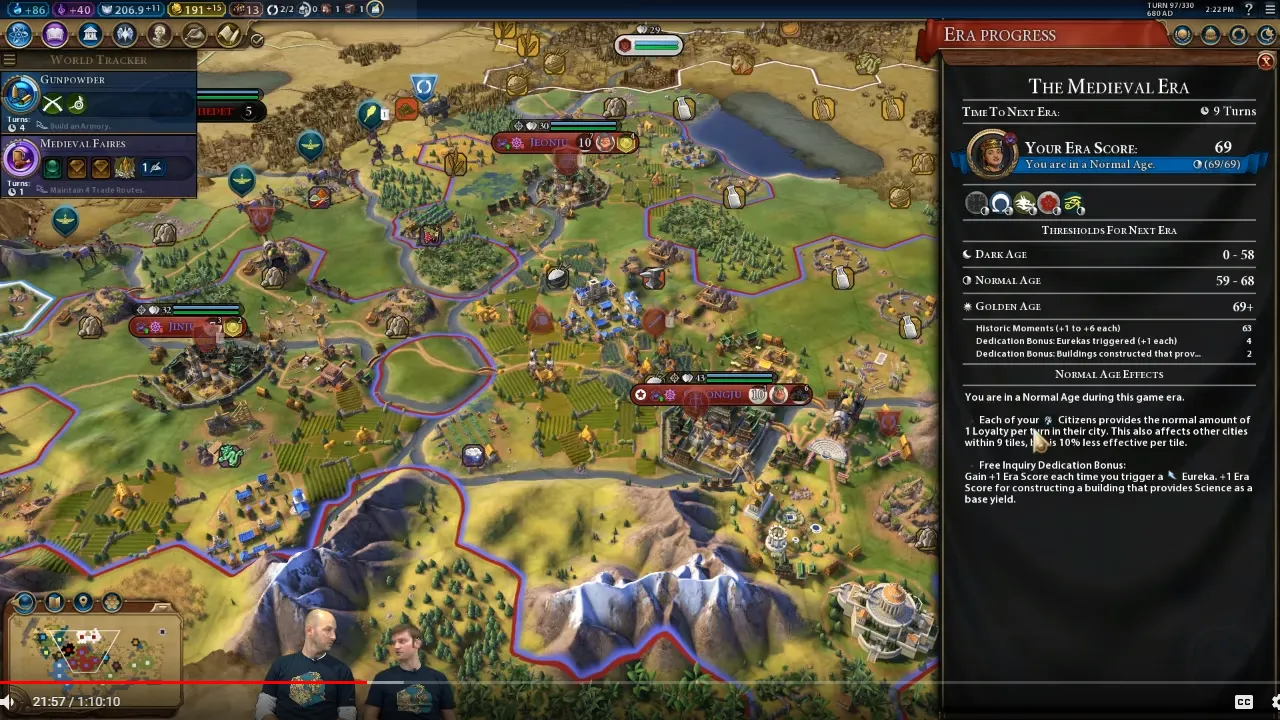
When you enter an era the game calculates threshold values for era scores that will get you to a normal or golden age in the next era. The devs said that it factors in your era score when you enter the era, the size of your civ, and whether you've been in dark or golden ages before. This means that you can't just build a powerful civ in the beginning and coast from golden age to golden age, you have to exceed the bar you set for yourself.

You also get to pick a Dedication for your civ for the era, which gives you a specific way to earn era score, and has some other gameplay effects depending on whether you're in a dark, normal, or golden age. There are four choices for each era, with options cycling in and out over time in keeping with what's historically relevant.

Also, if you're in a dark age you get an additional set of social policies that go in a wildcard slot. These have powerful bonuses to help you get your civ back on track, but unlike normal social policy cards they all come with a BUT clause that gives you a significant negative effect if you use them.
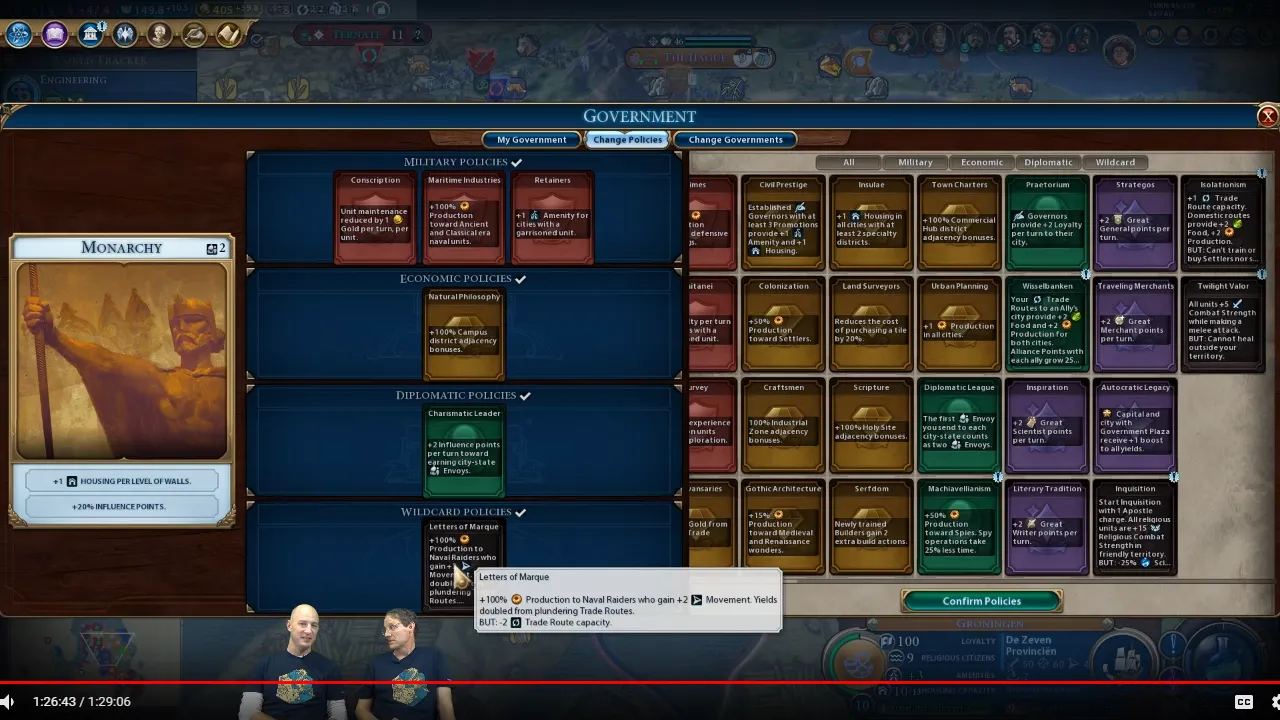
The game keeps track of every civ's development progress to determine when “the world” moves to different eras, it gives you a rough range at first but then a more precise countdown when the era transition is within ten turns.
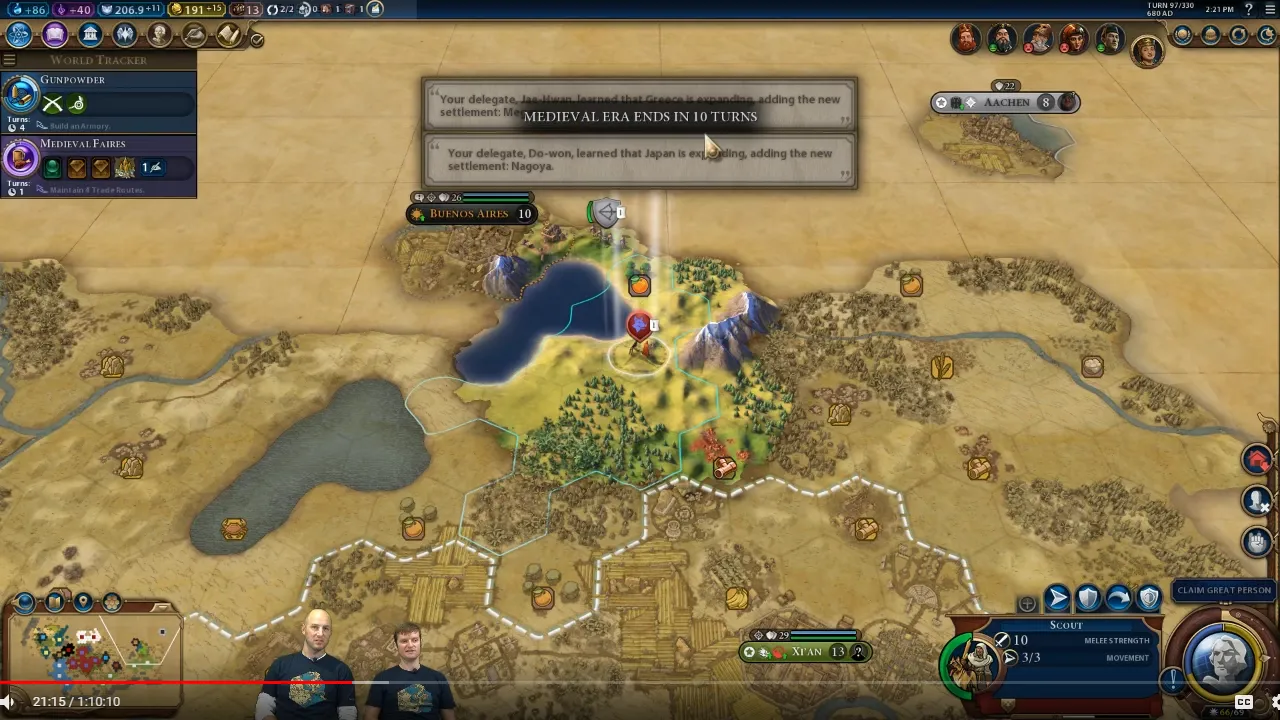
Governors
Another new subsystem in Rise and Fall is governors. These won't work like great people or heroes in other games where you aren't sure which ones you'll get. Instead the same seven governor “characters” are always available to every civ, representing certain archetypes, and what will change from game to game is which ones you choose to use and which elements of their promotion trees you choose to follow. Governor “titles” that you use to bring in a new one at level one or upgrade an existing one's promotion tree, are granted via various developments, wonders, etc., analogous to the way that those things grant more trade routes.
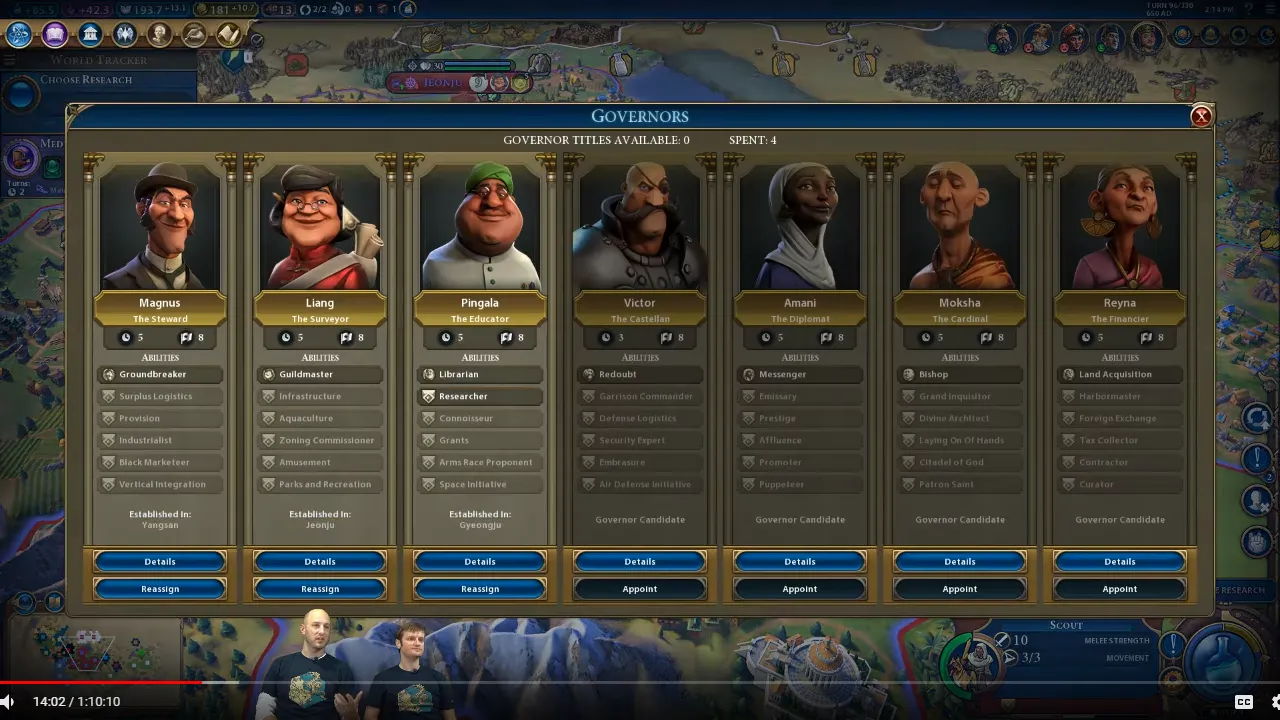

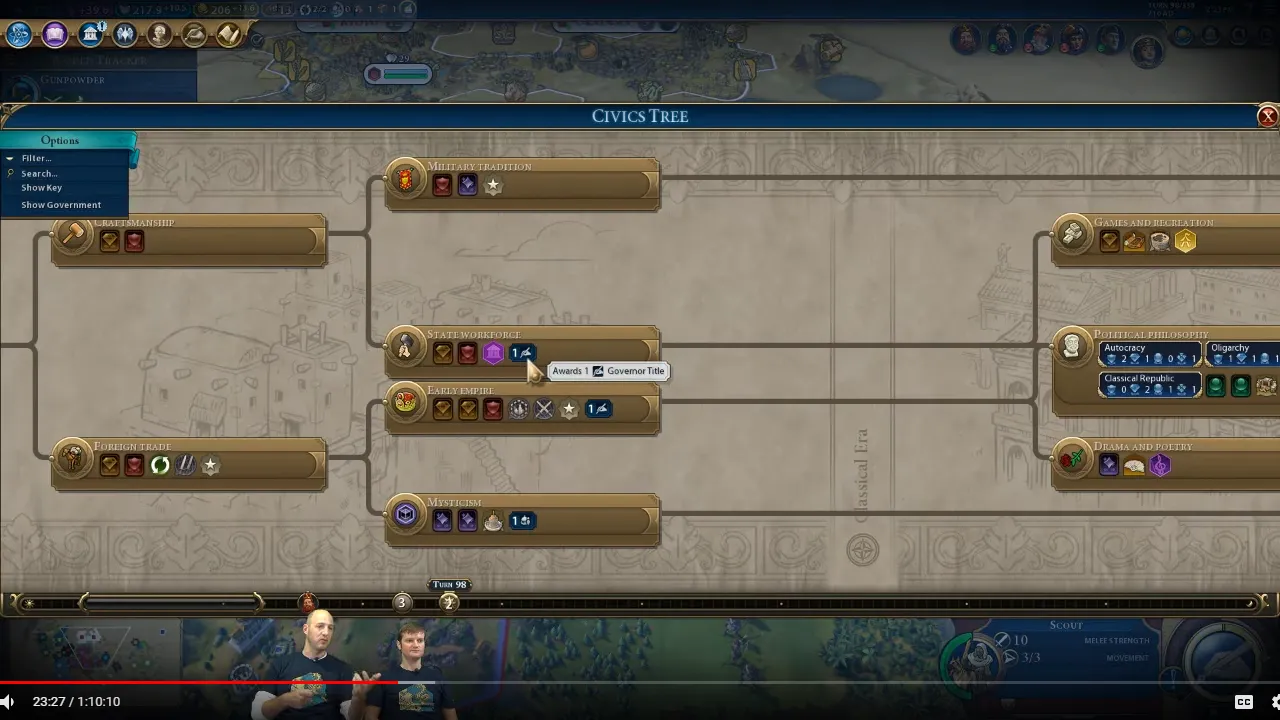
Government Districts
One city in your empire can build a Government District, which gives powerful adjacency bonuses, lets you build some buildings that give you civilization-wide effects, and are a factor in the new “legacy” system.

In the base game, your government would earn a “legacy bonus” by spending a certain amount of time in a government. They've changed that. Now, when you build a government building you gain a new social policy card that goes in a wildcard policy slot that gives you a bonus flavored to that government type. This seems like a cool change to me, the old legacy bonus system was so minor and gradual that I often completely forgot about it.
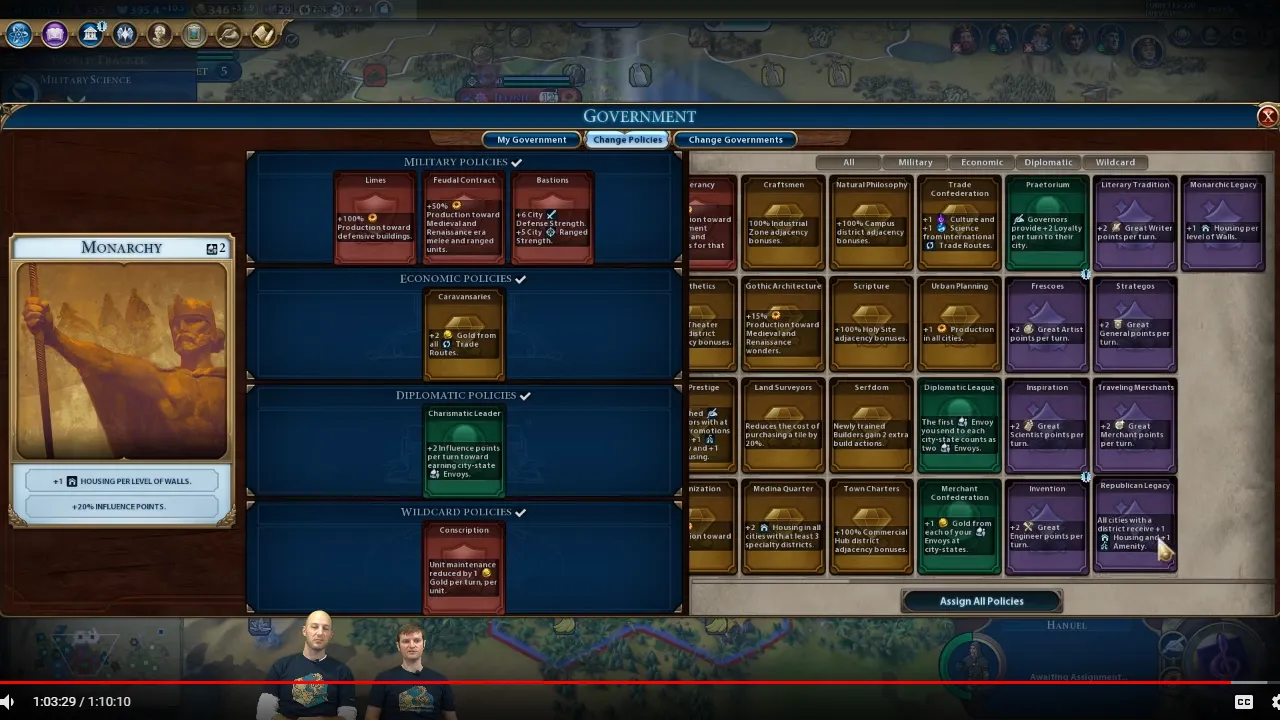
Loyalty
They didn't go into the new Loyalty subsystem in too much depth in these streams since they're planning to do a future stream where they focus on it, but they did touch on a few things. The dark/golden nature of your age affects your cities' loyalties, making it harder to hold on to cities during dark ages and easy for you to absorb free cities during golden ages. Governors affect loyalty, especially the “diplomat” governor who influences other cities near to where they're stationed. If one of a civ's cities' loyalty drops too low it becomes a “free city”. On the other hand, if you can achieve a high enough loyalty on another city they'll offer to join your empire.

Combat bonus for diplomatic visibility
They're enhancing the “diplomatic visibility” subsystem so that it also gives you a combat bonus against civs you have visibility with. Declaring war removes the visibility you get from things like embassies, but this can be a benefit for things like spies. The Mongolian special power builds on top of this: they'll get an extra combat bonus for diplomatic visibility over and above the default bonus, to represent Genghis's clever use of intelligence and getting inside help during his conquests.
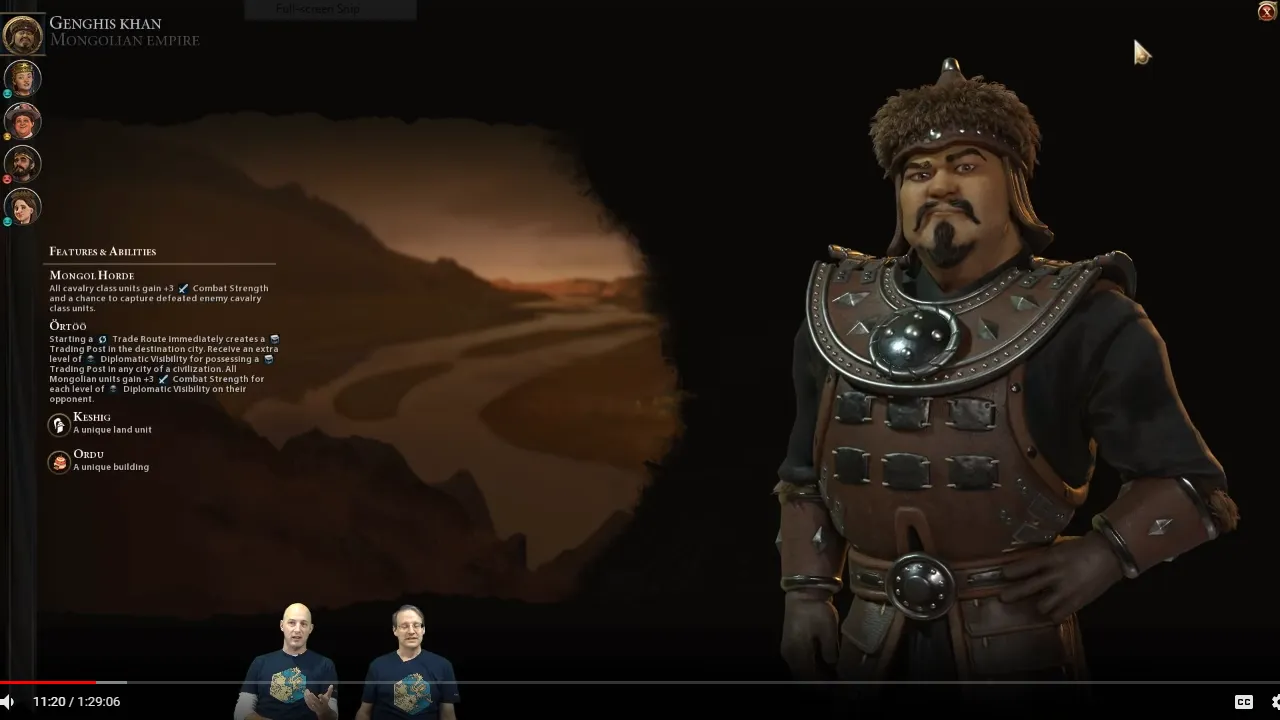
Miscellaneous Stuff
In addition to the new subsystems they're also making some minor changes. They've changed the algorithm for placing civs and city-states on the map. They're adding some new luxury resources, new natural wonders (such as The Matterhorn, which gives the “high altitude training” perk to units that walk next to it, like Mt. Kilimanjaro did in Civ 5), new buildable wonders, and reef terrain.

Concluding thoughts
I thought Civ 6 was good but not great, especially when compared to the fully-expanded Civ 5. I'm cautiously optimistic that the Rise and Fall expansion will improve things. Trying to bring more dynamism to a 4X game is no small design challenge, but it will be very cool if they can pull it off, so I hope they can do it. A lot of the things I saw in the streams were interesting, but I don't think it's a great format for getting a real feel for the gameplay yet – being a good “Let's Play” host is a skill that most game devs haven't developed, and since they're starting in-progress games it's hard to get a feel for the actual game rather than it just being a vehicle to demo various aspects of the subsystems. But I was intrigued by the things they did demo.